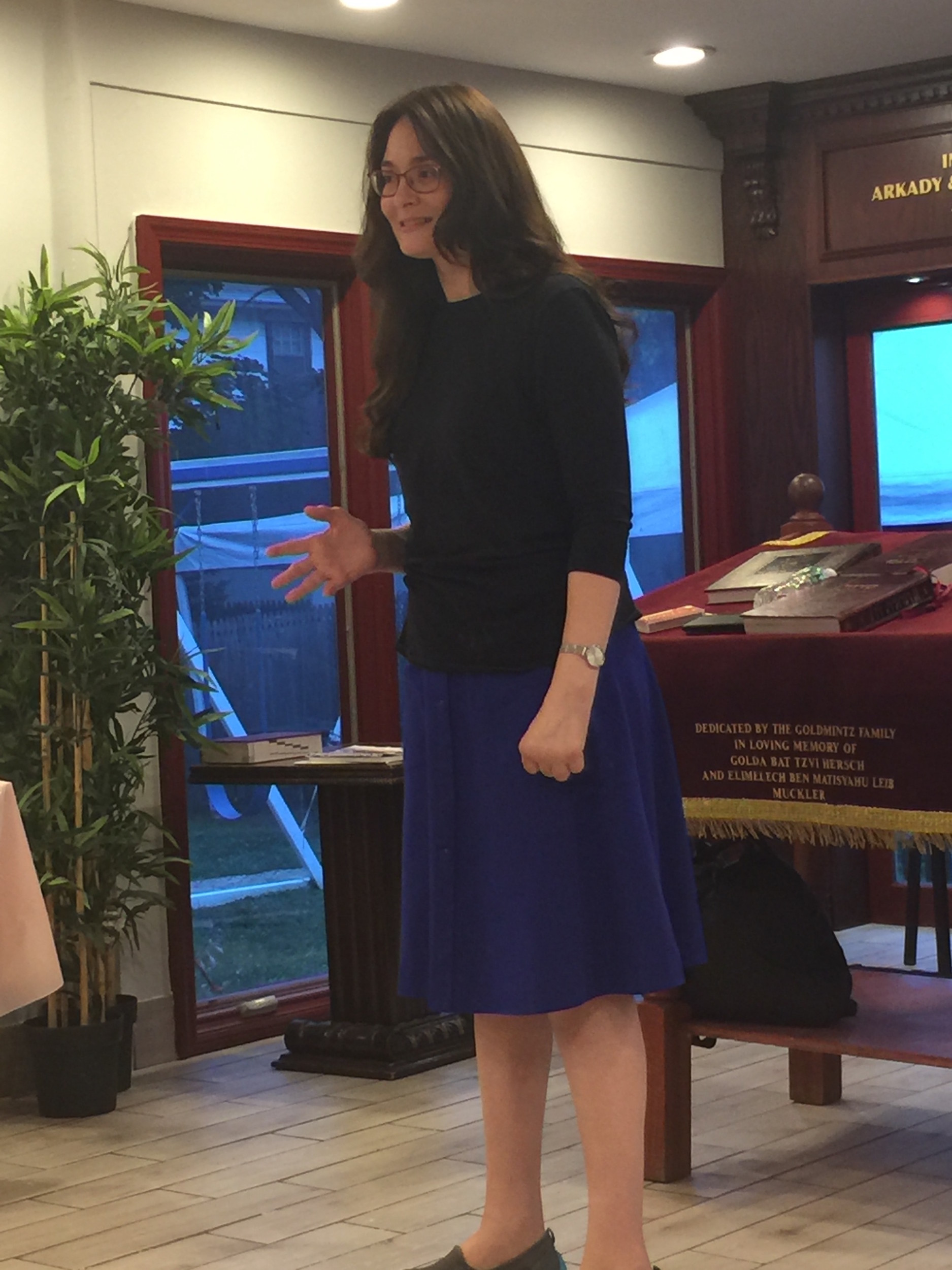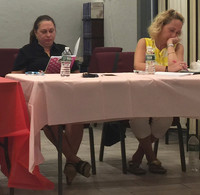Sparking their Jewish souls
Chabad of Hewlett holds bat mitzvah classes for women
Standing in front of seven women at the Chabad of Hewlett, Rebbitzen Rivkie Tenenboim struck a long wooden match and ignited a flame to illustrate that God, according to the Jewish Bible, created light first — a spark that culminates with a bat or bar mitzvah for girls or boys, respectively, as they take on the responsibilities of Judaism.
“Every Jewish child’s soul is like flame,” Tenenboim said, “and it sparks at the bat or bar mitzvah and becomes a flame.”
The women, all members of the chabad — or as Susan Ballison said, “We are family,” — want to delve more deeply into their Jewish roots and understand the Torah better, they said. Through July and August, Tenenboim, the wife of Rabbi Nochem Tenenboim, the spiritual leader of the Chabad, is conducting five classes in which the women will explore and learn Jewish traditions as if they were preparing for their bat mitzvahs.
Hewlett resident Dale Durdunas, 47, grew up in Brooklyn. In a family not well off, her brother had a bar mitzvah, but she did not have a bat mitzvah, she said. Her daughter, Corrina, had one last year at age 13.
“I grew up in a poor family,” Durdunas said before the first class began on July 12. “It was also not as popular as it is now. I’m hoping this brings me closer to my Jewish roots.”
Bat mitzvahs for girls did not come into vogue in Orthodox synagogues until the 1980s and ’90s, according to Paula Hyman, who wrote an article on the topic for the online Jewish Women’s Archive. She noted, as many Jewish historians do, that the first American bat mitzvah was celebrated by Judith Kaplan Eisenstein, whose father, Rabbi Mordecai Kaplan, had her recite blessings and read a portion of the Torah in Hebrew and English at a service at the Society for the Advancement of Judaism on Manhattan’s Upper West Side in 1922.
“The bat mitzvah ritual was introduced into American Judaism as both an ethical and a pragmatic response to gender divisions in traditional Judaism,” Hyman wrote. “For boys, reaching religious majority occasioned a ritual ceremony in the synagogue, but for girls, attaining the status of adult received no communal attention.”
With few exceptions, bat mitzvahs do not replicate the bar mitzvah ceremony, in which a boy recites a haftorah — a reading from the prophets that is linked to that week’s Torah portion — and recites blessings during the Shabbos service. Traditional Jewish law allows only men to read from the Torah. In some synagogues, the bat mitzvah girl reads what is called the devar Torah — a commentary on that week’s Torah portion.
The idea for the classes was sparked about three years ago, when Rabbi Tenenboim spoke at a funeral about Jewish education, and the granddaughter of the deceased woman said she never had a bat mitzvah. “It’s never too late to do a good deed,” the rabbi said, his wife recounted. “The woman started studying with me, and then celebrated her bat mitzvah, along with her 30th birthday!” Tenenboim said.
Beginning with discussing the 613 mitzvahs — good deeds — that are a part of Jewish customs, Rebbetzin Tenenboim will lecture, distribute articles and apply her experience teaching bar mitzvah boys and bat mitzvah girls, albeit with a more adult tone, as she encourages the women to “celebrate their Jewish identity.” “Each person is a whole world, and it’s an awesome responsibility to teach them,” she said, “one I don’t take lightly.”
Throughout the hour and 15 minutes, Tenenboim noted the usefulness of committing a prayer to memory, such as the Shema that begins, “Hear, O Israel, the Lord is our God, the Lord is one.” By reciting this line, many Jewish children who were placed with non-Jewish families after the Holocaust were found, she said.
“I feel very connected to Judaism, but I have very little Jewish knowledge,” said Hewlett resident Judy Metz, 79, who grew up in Kew Garden Hills and did not have a bat mitzvah. “I want to learn more and reinforce my Judaism,” added the grandmother of four children ranging in age from 14 to 21.
Susan Ballison, 69, who also lives in Hewlett and didn’t have a bat mitzvah, said her husband and two grown daughters are excited about her taking these classes. “I’m looking to gain a greater awareness of my Jewish heritage,” she said.
After the classes are completed, there will be a bat mitzvah celebration for the women on Aug. 16.

 44.0°,
Mostly Cloudy
44.0°,
Mostly Cloudy 








